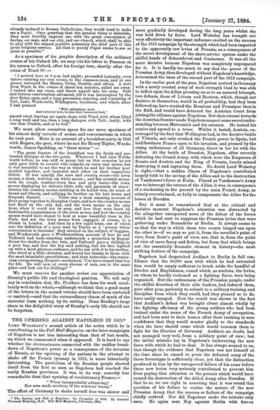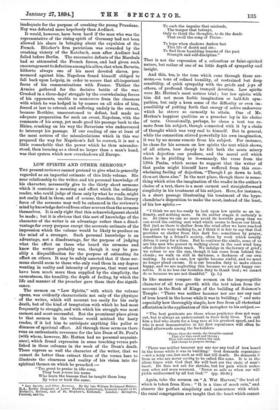TUE UPRISING AGAINST NAPOLEON IN 1813.* LORD WOLBELEY'S second article
of the series which he is -contributing to the Pall Mall Magazine on the later campaigns of Napoleon is not less interesting than that of last month, on which we commented when it appeared. It is hard to say whether the circumstances connected with the sudden break- down of Napoleon's power as a consequence of the invasion of Russia, or the uprising of the nations in the attempt to shake off the French tyranny in 1813, is more historically interesting. The patriotism of the Russian people showed itself from the first as soon as Napoleon had reached the really Russian provinces. It was, in its way, scarcely less remarkable than that uprising of revolutionary France,— "When insupportably advancing,! Her arm made mockery of the warriors' tramp."
The effort of Germany to shake herself free was slower and
• The Decline and Pali of Napoleon: the Campaign of 1813. By General Viscount Wolseley, S.P. Pali Mali Magazine, February, 1%4.
more gradually developed during the long years whilst she was held down by force. Lord Wolseley has brought out very effectively the important influence exerted on the success of the 1813 campaign by the strength which had been imparted to the apparently raw levies of Prussia, as a consequence of the secret development of the short-service system under the skilful hands of ScharnhOrst and Gneisenau. It was all the more decisive because Napoleon was completely unprepared for it. It is hardly too much to say that the power of the Prussian Army,thus developed without Napoleon's knowledge, determined the issue of the second part of the 1813 campaign.
In the earlier part of the year, Napoleon arrived in Germany with a newly created army of such strength that he was able to inflict upon theAllies pressing on as to an assured triumph, two defeats, those of Liitzen and Bautzen, which, though not decisive in themselves, would in all probability, had they been followed up, have crushed the Russians and Prussians then in the field, and would have deterred the Austrian Court from joiningthe alliance against Napoleon. But theirretreat towards the Austrian frontier made Napoleon suspect some secret under- standing between Metternich and his enemies. He halted his armies and agreed to a truce. Whilst it lasted, Austria, en- couraged by the fact that Wellington had, in the decisive battle of Vittoria, not only crushed the French power in Spain, but laid Southern France open to his invasion, and pressed by the rising enthusiasm of all Germany, threw in her lot with the Allies. At the battle of Dresden, Napoleon, after severely defeating the Grand Army, with which were the Emperors of Russia and Austria and the King of Prussia, barely missed destroying it and capturing them. No doubt Lord Wolseley is right,—that a sudden illness of Napoleon's contributed largely both to the saving of the Allies and to the destruction of Vandamme's force at Halm. Placed as Vandamme's Army was to intercept the retreat of the Allies, it was, in consequence of a slackening in the pursuit by the main French Army, so utterly overwhelmed, as fully to compensate the Allies for the losses at Dresden.
But it must be remembered that at the critical and decisive moment Napoleon's attention was distracted by the altogether unexpected news of the defeat of the forces which he had sent to suppress the Prussian levies that were gathering under Bernadotte at Berlin. It always seems to us that the way in which these two events hinged one upon the other is—if we may so put it, from the novelist's point of view, from Scott's point of view, not, that is, from the point of view of mere fancy and fiction, but from that which brings out the essentially dramatic element in history—the most striking feature of the campaign.
Napoleon had despatched Audinot to Berlin in full con- fidence that the 60,000 men with which he had entrusted him would be amply sufficient to brash aside the handful of Swedes and Englishmen, round which, as nucleus, the levies, on whom he hardly reckoned as a fighting force, were being organised. But the enthusiasm of the Prussian people, under the skilful direction of their able leaders, had induced them, year after year, patiently to submit to a military training and discipline from which they could, had they pleased so to do, have easily escaped. Now the result was shown in the fact that Audinot's defeat was brought about almost wholly by the fighting efficiency of the young soldiers who had been trained under the noses of the French Army of occupation, and had been sent to their homes after their training in sure confidence that they would muster gladly to the standards when the hour should come which would summon them to fight for the liberties of Germany. Audinot, no doubt, had not managed very well, from a military point of view; but the initial mistake lay in Napoleon's underrating the new force with which he had to deal. It has always seemed to us, that though the evidence that Napoleon was not himself at the time since he ceased to press the defeated army of the three Sovereigns is sufficiently clear, yet that the distraction produced in him by the unexpected failure of his arms before these new levies very seriously contributed to prevent him from paying that attention to the pursuit which would have caused the destruction of the Allied Army after Dresden. If that be so, we are right in asserting that it was round this question of his failure to realise the nature of the new Prussian Army, that the success or failure of the campaign chiefly centred. Nor did Napoleon make the mistake only once. He again sent Ney against Berlin with forces inadequate for the purpose of crushing the young Prussians. Ney was defeated more hopelessly than Audinot.
It would, however, have been hard if the man who was the representative of the rising spirit of Germany had not been allowed his share in bringing about the expulsion of the French. Bliicher's firm patriotism was rewarded by the crashing victory of the Katzbach, soon after Andinot had failed before Berlin. The successive defeats of the Marshals had so attenuated the French forces, and had given such encouragement to defection among his allies, that when Bavaria, hitherto always one of his most devoted slaves, pro- nounced against him, Napoleon found himself obliged to fall back upon Leipzig, in order to secure that all-important focus of his communications with France. Thither the Armies gathered for the decisive battle of the war. Crushed in a three-days' struggle by the overwhelming forces of his opponents, unable to mancenvre from the closeness with which he was hedged in by masses on all sides of him, forced at last to retreat, and suffering unduly in the retreat, because Berthier, unaccustomed to defeat, had made no adequate preparation for such an event, Napoleon, with the remnants of his army, yet made good his passage back to the Rhine, crushing on his way the Bavarians who endeavoured to intercept his passage. If our reading of one at least of the most serious of the miscalculations which in this war prepared the way for Napoleon's fall be correct, it is not a little remarkable that the power which he thus misunder- stood, then looming as a cloud no larger than a man's hand, was that system which now overshadows all Europe.



















































 Previous page
Previous page